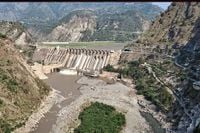In an extraordinary turn of events, the Chenab River at Akhnoor witnessed an unprecedented drop in water level on Sunday, May 4, 2025, reducing the mighty waterway to a shallow stream barely knee-deep in some areas. This dramatic change occurred after authorities closed the gates of the Baglihar and Salal hydroelectric dams in Ramban and Reasi districts, drastically curtailing the river’s downstream flow.
The significant decrease in water discharge came in the wake of the Indian Government’s decision to suspend the Indus Waters Treaty (IWT) following the deadly April 22 terrorist attack in Pahalgam, which claimed 26 lives—most of them tourists. The suspension of the IWT and subsequent water control measures were widely seen as a strong message to Pakistan, with the river’s depleted flow symbolizing India’s resolve to respond strategically to cross-border terror.
By early morning, residents of Akhnoor town and surrounding villages awoke to the rare and surreal sight of a nearly dry Chenab. What is usually a fast-flowing river was reduced to a mere trickle in many parts. Word spread quickly, and by mid-morning, crowds had gathered at key riverbank locations such as Jia Pota Ghat, Pandav Cave, and near the historic Gurdwara site. In scenes reminiscent of a local fair, men, women, and children flocked to the riverbanks—some cautiously wading across, others gleefully recording videos and taking selfies as they walked across the Chenab.
A sense of patriotic enthusiasm also surfaced, with several youths seen chanting slogans in support of Prime Minister Narendra Modi and hailing the government’s firm stand against Pakistan. Interestingly, the low water levels exposed the riverbed at multiple points, prompting some locals to search for long-lost valuables. A few individuals reportedly recovered gold ornaments, silver coins, and other trinkets, likely remnants of past accidents or ceremonial offerings swept away by the river over time.
However, the sudden influx of people to the shallow riverbed raised serious safety concerns. Police teams from the local Akhnoor station, led by senior officers, rushed to the scene and began dispersing the crowds, using loudspeakers to warn against attempting to cross the river. Authorities cautioned that recent rainfall in the upper catchment areas could cause a sudden surge in water levels, posing a grave risk to anyone in the river’s path. “We are anticipating a quick rise in water levels due to rainfall upstream. People must vacate the riverbanks immediately to avoid any mishap,” a police official warned.
The river’s unusual state was not confined to Akhnoor alone. Similar scenes were reported from other Chenab-adjacent regions, including Barandari, Dera Baba Banda Bahadur in Reasi, and as far upstream as Ramban and Sangaldan. In some areas, parts of vehicles that had previously fallen into the river during road accidents were now visible on the dry riverbed. However, despite the opportunity to inspect these long-submerged locations, no human remains of past accident victims were discovered, according to local police.
The National Hydroelectric Power Corporation (NHPC), which manages both the Baglihar and Salal dams, confirmed that the sharp decline in river flow was a direct result of reservoir refilling operations. De-silting work had been conducted in recent days, after which the dam gates were temporarily closed, leading to the steep drop in downstream water discharge. By late afternoon on Monday, May 5, 2025, dam authorities partially reopened a few gates, allowing water to resume its flow into the lower reaches of the river.
The water level gradually began to rise again, prompting renewed alerts and monitoring from local administration and police. Local villagers, particularly the elderly, remarked that they had never before witnessed the Chenab recede to such a level. “It is unbelievable. In all my years, I’ve never seen the Chenab look like this. It felt like we were walking through a shallow stream, not one of the most powerful rivers in North India,” one resident of Akhnoor stated.
Many residents interpreted the spectacle as more than just a natural event, seeing it as a symbolic demonstration of India’s geopolitical leverage. “Pakistan must understand that our rivers are not theirs to take for granted. They must pay the price for every drop of Indian blood spilled by terrorists,” said a youth in Akhnoor.
While the episode created a sense of awe and curiosity among the public, it also underlined the sensitive balance of water diplomacy and the ecological consequences of transboundary tensions. Authorities have urged the public to exercise caution and refrain from venturing into riverbeds during such periods of altered flow, as water levels can rise suddenly and dangerously. As dam gates open and the Chenab begins to flow freely once more, the situation remains a poignant reminder of the intertwining of nature and geopolitics.





